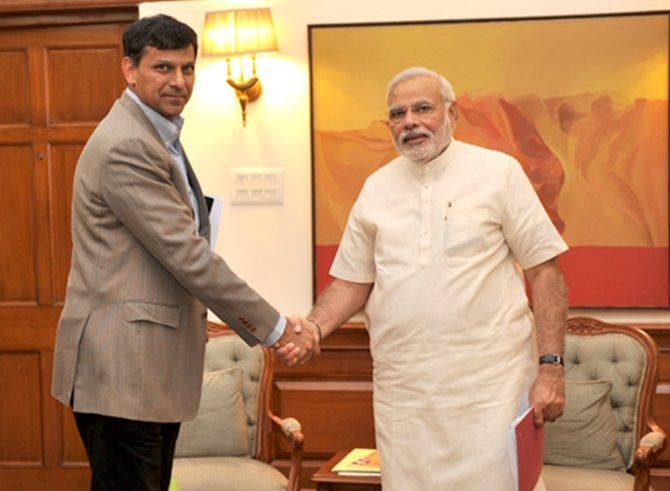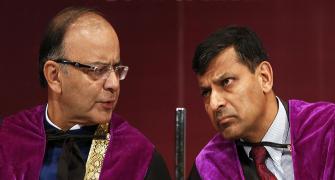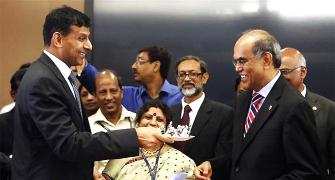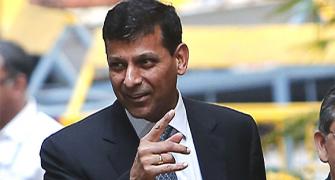The government’s critics say that the Prime Minister failed to rein in vicious and unprecedented personal attacks on the central bank chief by the likes of Rajya Sabha MP Subramanian Swamy.

A day after Reserve Bank of India governor Raghuram Rajan’s announcement regarding his intention to not seek a second term, the reaction from New Delhi’s bureaucratic and policy making circles was as varied as that of civil society.
Senior officials in the government said Rajan’s decision to leave at the end of his term in September had been respected by the centre but maintained that controversial statements by members of the ruling party had no bearing on any discussion between Prime Minister Narendra Modi, Finance Minister Arun Jaitley, and Rajan.
It is learnt that ahead of writing the now deeply dissected to his colleagues, Rajan had spoken to Jaitley on the future course of action. Although there was a meeting between Modi and Rajan more than a fortnight ago, no direct discussion on renewal of his tenure was discussed, it is learnt.
The government’s critics say that the Prime Minister failed to rein in vicious and unprecedented personal attacks on the central bank chief by the likes of Rajya Sabha MP Subramanian Swamy. Senior officials however, say that it is unlikely that Modi himself would have paid heed to extra-governmental influences.
“As the Prime Minister, there are multiple global and national issues that he has to deal with. Even now, his focus is on India’s bid to enter the Nuclear Suppliers Group and on the spike in prices of foodgrains and pulses,” said an official.
“Subramanian Swamy is Subramanian Swamy, and of course his statements were avoidable. But in all likelihood, PMO did not pay much attention to them,” the person said.
On the other hand, some senior officials said that Rajan’s near-celebrity status and media management had annoyed the government. The extensively covered quote of leading Indian-American economist at Princeton University Avinash Dixit, on June 6, appears to have been the last straw in the Rajan case, a source in the NDA government said.
Dixit had told a news agency, ‘’I think Raghuram Rajan deserves a second term as RBI governor ….he should have full operational independence in pursuing targets (inflation, employment or growth).’’ The source said that it was an example of ‘’Rajan’s talent for media management’’.
There were others within India and outside who echoed similar sentiments on Rajan thereafter, prompting the government to rethink on renewal of his term at the central bank. ''Till then, there was no decision on the matter,'' the source said.
‘’The larger than life image of Rajan and his habit of reaching out to the media for everything did not go well with the government. He should have realised he’s part of the government,’’ another source pointed out. There was never a doubt that Rajan was competent, but that’s not the only thing that a government looks at in key jobs, the person added.
The thing that has some of the policymakers worried, is the timing of Rajan’s announcement, coming as it does just days ahead of the ‘Brexit’ referendum in Great Britain on June 23.
“Maybe he could have timed it better. Brexit is days away and the combined impact on the markets could be a cause of concern,” said a second official. The person said that any bear effect to equity and money markets due to Rajan’s exit announcement will be temporary and marginal compared to the possible longer-term effects of ‘Brexit’ referendum.
“Investors do not make decisions based on a personality. However, there is still a question of uncertainty over Rajan’s successor and future course of action in RBI and it will perhaps weigh upon the markets,” the person said.
Even as there’s no clarity yet on whether the search committee headed by the cabinet secretary P K Sinha would select the next RBI governor, the top three names doing the rounds to succeed Rajan are Arundhati Bhattacharya (SBI chairman), Subir Gokarn (former deputy governor of RBI) and Urjit Patel (deputy governor of RBI).
A source however argued that RSS may have a view on who will hold the critical post. If that happens, Gokarn and Patel may have an edge over Bhattacharya, the only woman candidate for the job. However, if Bhattacharya is indeed selected as the first woman RBI governor, the NDA government is likely to list that as one of its achievements. Other officials, however, including one of the sources quoted above, said that any of the names being played in the media were in the realm of ‘pure speculation’. “Nothing has been decided yet,” the first official said.
Voices
“Given choices of this govt - Gajendra Chauhan to Chetan Chauhan may appoint #VijayMallyasRBIGov Has great experience of banking system?”
Congress leader Manish Tewari on Twitter
“I am not surprised but sorry for India's reputation abroad. He was criticised for doing what a central banker has to do. It will be seen by the world at large that an anti- inflation policy, a policy of cleaning up non-performing assets of banks and being tough on banks' balance sheets are not policies which meet with approval in India”
Indian-origin economist and British Labour Party leader Meghnad Desai
“Raghuram Rajan's decision not to seek a second term would be very costly for the economy. Not a good omen”
Former finance secretary Arvind Mayaram on Twitter
“I know many voices in corporate India who are disappointed. Today we are in a very complex economic environment globally. A strong understanding of global economics and the kind of wisdom and experience Rajan brought in to counter many of these kind of headwinds is something we benefited from”
Biocon chief Kiran Mazumdar-Shaw
“I really want to emphasise that it is extremely important to have stability at the top of the central bank and it is to be taken as something important”
Former RBI deputy governor Rakesh Mohan










